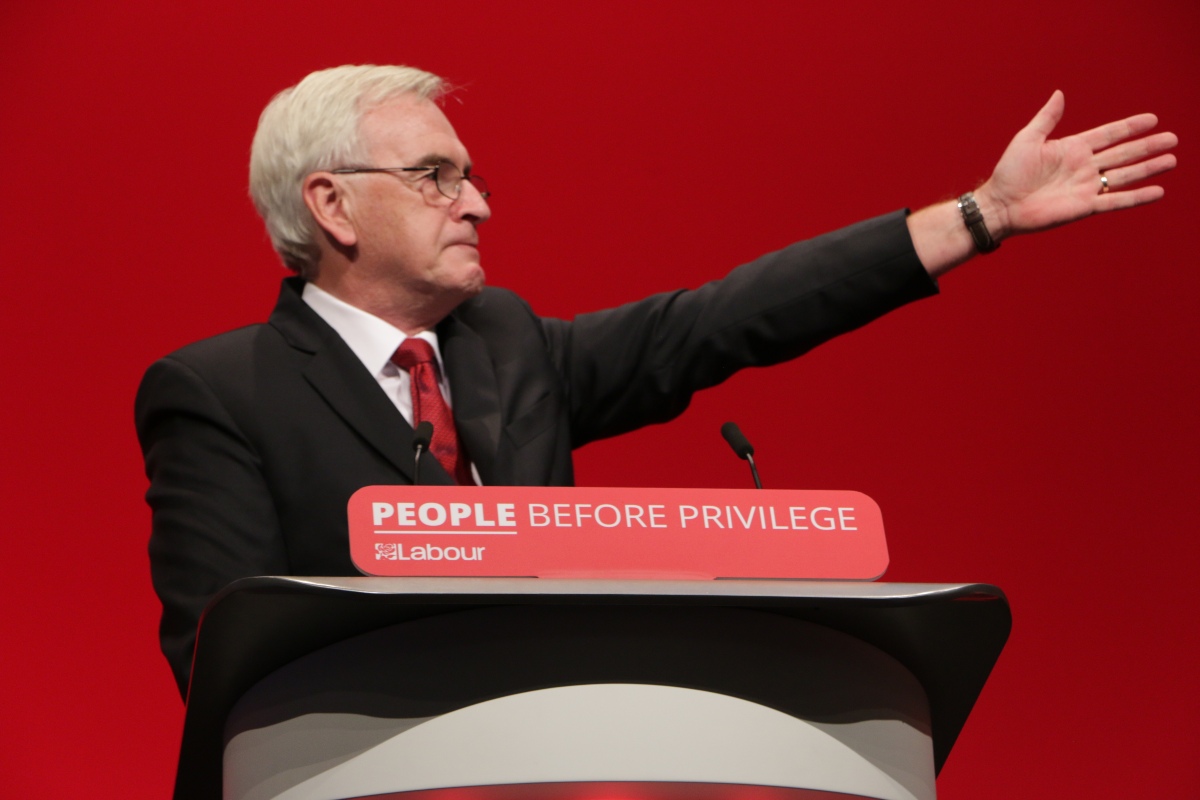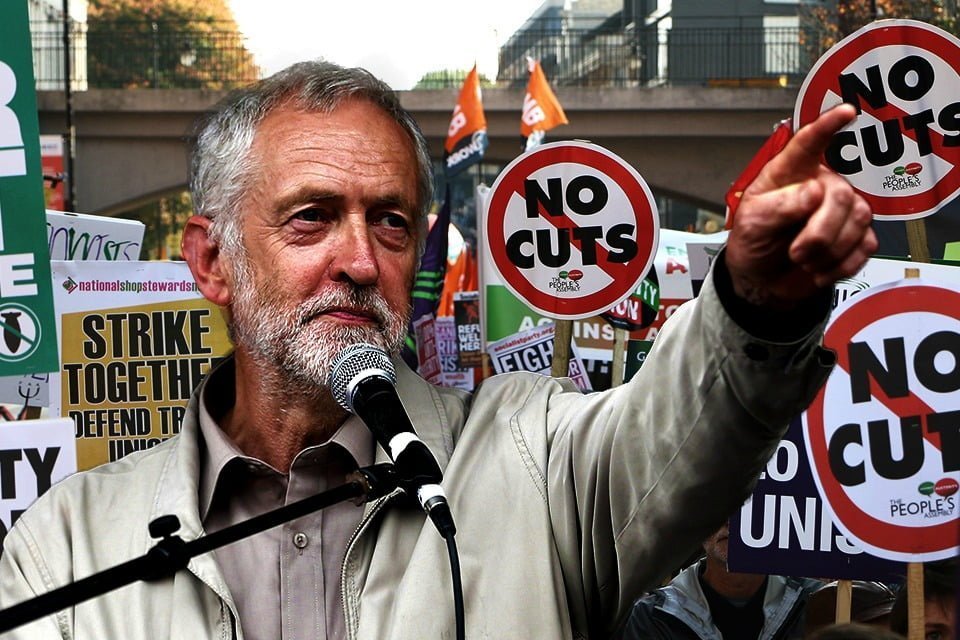Britain is in a deep crisis, the ruling class has completely lost control and another election is fast approaching. Big business is threatening mass sabotage against a potential Labour government, Labour must respond with bold socialist policies.
Britain is in the grip of an unprecedented crisis. The Brexit deadline is fast approaching. Boris Johnson’s government has hit the buffers and lost control of the situation. The scene is set for the most important and most bitterly-fought general election since the war.
Despite all the crosscurrents, Labour can certainly win this election. We saw what happened in 2017, when Labour issued a left-wing manifesto and Corbyn toured the country. This inspired millions. Labour, which was originally 20 points behind the Tories, in the end saw its largest rise in vote since 1945. This was despite the attempted sabotage by Labour HQ and the Blairites.
Even the right-wing press are concerned that a Labour victory is the likely scenario. “With the UK sliding (quite unnecessarily, but seemingly inexorably) towards 1) the destructive absurdity of a ‘no deal’ Brexit, 2) a constitutional crisis, 3) a further slump in the battered pound, and 4) an early general election, the chances of a new government dominated by the hard-left Labour Party are looking far more likely than polls currently suggest,” explained the National Review (9/8/19).
A Corbyn government will face massive challenges, not least from the Blairite Fifth Column within the Parliamentary Labour Party.
Broken status quo
 Labour has promised to govern “for the many not the few”. After decades of attacks on the working class, millions are desperately looking to Labour to solve their problems.
Labour has promised to govern “for the many not the few”. After decades of attacks on the working class, millions are desperately looking to Labour to solve their problems.
About 14 million people in Britain are characterised as living in poverty – 8 million of whom live in families where at least one person is in work, according to the Joseph Rowntree Foundation (JRF), a think-tank.
Real wages have fallen in the last decade by more than any other comparable period since the Napoleonic Wars. We have faced a decade of brutal austerity and cuts. The bragging about record levels of employment ignores the growth of self-employment and part-time precarious work, which has become a plague on society. No wonder there is widespread bitterness and anger towards the broken status quo.
Meanwhile, the rich have become massively richer. The Sunday Times Rich List shows Britain’s 1,000 wealthiest individuals and families are sitting on a record £771.3bn, up £47.8bn in a year.
This brings to mind Marx’s description of the “increasing misery” within capitalism, where agony and toil accumulates at one pole, while extreme riches and wealth are accumulated at the other. This analysis has always been routinely ridiculed by reformists and defenders of capitalism. But now it reveals itself in laboratory form as the reality of present-day society.
Today, the British economy is shrinking fast and threatening to descend into a full-blown recession, even before Brexit. Industry is facing endless closures, from the Harland and Wolff shipyard, to Ford factories and British Steel plants, to civilian shipbuilding on the Clyde, involving the loss of thousands of skilled jobs.
Other sectors, like retail, are also being hit hard. Business investment is tumbling, falling by 11% in three years. Mark Carney, the governor of the Bank of England told MPs the economy was running at “close to zero”.
But this is only part of the picture. To make matters worse, the world economy is on the verge of another devastating slump. “It’s the calm before the storm,” states the Financial Times. “As any number of indicators now show…the global downturn has already begun.” (FT, 11/8/19)
All the indications are that this slump will be deeper than 2008-9. This time, central banks have run out of ammunition. Interest rates are already at historically low levels. Pouring more money into the economy will simply add to a world already swimming in debt.
No room for reforms
I n the face of this, a new Labour government is going to face severe economic difficulties. The only comparison we can draw – an ominous one – is with the deep crisis that faced the 1929-31 Labour government. This ended in a humiliating collapse.
n the face of this, a new Labour government is going to face severe economic difficulties. The only comparison we can draw – an ominous one – is with the deep crisis that faced the 1929-31 Labour government. This ended in a humiliating collapse.
The current era is not like the 1950s and 1960s, where the post-war upswing allowed for reforms like the NHS. We are in a period of capitalist downswing, where there is little room for reforms.
Of course, Labour’s promised reforms are very popular. These include stronger trade union rights; a £10 per hour “real living wage”; more council houses; free school meals; free buses for young people; and more funding for libraries, parks and leisure centres.
There are also promises to tackle climate change and to take the utilities, railways and postal service into public ownership. John McDonnell, the shadow chancellor, vows to end the “modern-day scourge” of in-work poverty within five years.
Much of the costings for these reforms, however, are based on the assumption of an expanding capitalist economy. Labour hopes to make ‘structural changes’, including pushing a more assertive industrial strategy, establishing a network of regional public banks, and putting workers on company boards. Social policies will be funded by higher taxes on corporations and the wealthy, and by closing tax loopholes. Labour will also borrow £250bn over 10 years for investment.
But given the deep crisis of capitalism and world slump, these measures will amount to tinkering with the system, rather than the fundamental change that is required.
Capitalists panicked
 Big business and the CBI have already made clear their opposition to Labour’s policies, especially plans for renationalisation. They are threatening a ‘strike of capital’, a run on the pound, and economic panic — all ramped up by the capitalist press and media.
Big business and the CBI have already made clear their opposition to Labour’s policies, especially plans for renationalisation. They are threatening a ‘strike of capital’, a run on the pound, and economic panic — all ramped up by the capitalist press and media.
They say investors will ‘head for the hills’. Behind the scenes, they are preparing to sabotage a future Labour government. “After a year of turmoil on the stock market and high street, the super-rich have a new fear — Corbygeddon,” states the Sunday Times. “Robert Watts reports on how they are planning to protect themselves from a hard-left government.”
“We are not sure whether we can trust him,” said one senior finance executive, who met with shadow chancellor John McDonnell. “He can be charming. But we have a nagging doubt that he is going to shaft us.”
They are terrified that a Labour government, under the pressure of a radicalised working class, will go much further than initially intended. They understand that appetite comes with eating, meaning that limited nationalisations could lead to far more.
And they are getting prepared. No ruling class in history has ever given up its power and privileges without a fight. As night follows day, the elite will wage war against a left Labour government.
Race to the bottom
The idea that we can ‘restructure’ Britain’s capitalist economy to make it function for working people is an illusion. Under capitalism, production is run for profit. And the capitalists make their profits from the unpaid labour of the working class.
From the 1980s, the bosses tried to restore the rate of profit with a campaign to squeeze more unpaid labour out of the working class. This involved zero-hour contracts, short-term temporary contracts, flexible labour, speed-ups and the like. This is the reason why working people are so burnt out today. Daily life has been reduced to one of increasing insecurity and hardship.
As a result, people are crying out for fundamental change. “Labour’s plans are striking a chord with many Britons who have endured stagnant wage growth and are increasingly uneasy about the deregulation and privatisations over the last three decades,” explained an article published by Reuters. This feeling that the system is broken was partly reflected in the Brexit vote.
The British economy is in the hands of the 1,000 richest families in the Sunday Times Rich List. Their sole motivation is profit. They are constantly trying to reduce labour costs – i.e. wages – and strip away regulations in order to boost their profits, and to hell with the consequences. If industries are closed and workers lose their jobs, so be it. Nothing must stand in the way of maximising their profits. This is the overriding law of capitalism.
Learning from history
 We must learn from the past, especially the experience of left governments. The fact is that all attempts by left governments to ‘control’ capitalism have completely failed. Rather than the government dictating to the capitalist economy, it is the capitalists who dictate to the government.
We must learn from the past, especially the experience of left governments. The fact is that all attempts by left governments to ‘control’ capitalism have completely failed. Rather than the government dictating to the capitalist economy, it is the capitalists who dictate to the government.
In France, the left-wing Mitterand government in 1981 came to power with a massive majority on a very left-wing programme. Within 12 months, Mitterand was forced to abandon his programme and carry through a deflationary policy of austerity and attacks.
More recently, the SYRIZA government in Greece promised to reverse austerity and defy the Troika. But it ended up capitulating and carried out even worse austerity than before. As with Mitterand, SYRIZA was rewarded by being thrown out of office.
No amount of tinkering on a capitalist basis is going to resolve this problem. It has been tried before. The same is true of Keynesian policies – financing budget deficits and government spending through borrowing. The real problem is one of ownership. As the adage goes: you can’t plan what you don’t control, and you can’t control what you don’t own.
Taking back control
How can a Labour government have control of the economy without taking over the banks and major monopolies?
The nationalisation of the banks and big financial houses – carried overwhelmingly at Labour’s 1976 conference – remains a piece of unfinished business. The 1931 Labour Party conference unanimously passed a resolution calling for the nationalisation of the banks and the direction of investment. Banking was the only major sector included for nationalisation in Labour’s 1945 programme that was left in private hands. Only the Bank of England was taken over.
Socialist planning of the economy is inconceivable without government control of the financial system. To implement an economy based on production for needs, it is vital that the financial system is used to direct resources to wherever they are most needed. At the moment, the opposite is the case. Resources are directed by the financiers to where the profits are fattest.
A socialist plan would use the financial system to ensure that money is available to finance a huge house-building programme, based on the needs of millions of families. This cannot be achieved by the capitalist market, but only by a conscious plan.
Labour promises a system of regional investment banks. But if established, these would be under the thumb of the four major private banks, with their massive resources. They recently made a combined profit of £16,398 billion – money sucked out of our pockets and into those of the bankers.
Labour’s policy will still leave the real power in the hands of a banking elite. The talk of further ‘regulation’ to make the financial sector ‘not master, but the servant of the economy’ is meaningless without public ownership. Such ‘regulation’ has been tried in the past and failed.
The idea has also been raised of a National Investment Bank. However, investment in a capitalist economy is not done for the public good but for profit. It is not the lack of money that is the problem for the capitalists, but the lack of profitable opportunities. At the moment it has been estimated that big business is sitting on £700 billion of cash.
With the prospect of a new slump, the capitalists are cutting their investments, not increasing them, as they fear shrinking markets and falling profits. Only a socialist planned economy can direct investment to where it is needed most.
Similarly, the idea of putting workers on company boards is nothing new. It has been applied in Germany for decades, yet power still rests with the capitalists. The same with the proposal for companies with more than 250 staff to redistribute their equity. Workers will not own the share, but will receive a dividend. This can only encourage workers to buy into capitalism, precisely at a time when capitalism is in meltdown. Hardly a winning policy!
Nationalisation
 Most seriously is the danger that Labour’s reforms could easily be shipwrecked in the coming world crisis. Austerity has never been a political choice, as some maintain. It flows directly from the global crisis – the deepest since 1929.
Most seriously is the danger that Labour’s reforms could easily be shipwrecked in the coming world crisis. Austerity has never been a political choice, as some maintain. It flows directly from the global crisis – the deepest since 1929.
Governments across the world – including the last Labour government – bailed out the capitalist system. And it was the working class who were asked to pay the bill. The private banks were bailed out with public money to the tune of billions; some partly nationalised, only to be rescued and handed back to the private sector. In other words, nationalisation was only used to bail out failing companies.
So what should a Labour government do in the face of this crisis? Does it abandon its programme, or does it use the crisis to carry out a fundamental transformation of society?
“I am serious in my intent. I want to transform this economy,” John McDonnell told Reuters in an interview. “That means evolving into a system which can achieve that equality, that democracy, that fairness, and tackles the major challenges that we are facing.”
We are sure this is a sincere view. However, capitalism cannot “evolve” into socialism. As the famous economic historian R.H. Tawney once said: “You can peel an onion layer by layer, but you can’t skin a live tiger claw by claw.” Capitalism is certainly not an onion. It is an insatiable tiger, with its own laws of motion, driven by the profit motive.
Transformation
Having said that, John McDonnell has said he hopes to go much further than the current position. He hopes that the economic climate will allow him to push through a more radical agenda – one far greater than Clement Attlee’s post-war government.
McDonnell has posed the issue quite sharply. “The question has focused on whether the Labour Party is a party of social reform aiming simply to ameliorate our existing capitalist society,” explained John, “or a reformist party that seeks to replace capitalism by incremental social reform, or a transformative, some would say revolutionary party, aiming at the radical replacement of the existing economic and social system.”
“The history of Labour holds open the possibility that the party could move beyond social reform and become a genuinely transformative party once again,” he said. “A party leadership under Jeremy Corbyn, and a mass membership shaped by the experience of the economic crash, the years of grinding austerity, and its resultant inequality and injustices, are taking their place in the history of the party.”
This is certainly a step in the right direction. The crisis of capitalism has undermined the possibility of “social reform”. In fact, the system is demanding counter-reforms. Therefore, the choice is either to attempt to patch up capitalism, and thereby bow to the laws of capitalism; or to put an end to this dog-eat-dog society once and for all.
The Labour Party originally stood for the latter, embodied in its socialist Clause Four. This was a vision for the revolutionary transformation of society. It is time we brought back this historic pledge.
Socialism
 If the Corbyn government is to succeed then it must introduce bold socialist measures. The problems of the working class cannot be solved within the confines of the capitalist system. The system has exhausted itself and has clearly reached its limits. A new slump threatens to turn into a depression.
If the Corbyn government is to succeed then it must introduce bold socialist measures. The problems of the working class cannot be solved within the confines of the capitalist system. The system has exhausted itself and has clearly reached its limits. A new slump threatens to turn into a depression.
This is a stark warning to Labour. The crisis should be confronted with crisis measures. Labour must push through an Enabling Act in Parliament to take over the ‘commanding heights’ of the economy – the top 150-or-so major monopolies, banks and insurance companies, under democratic workers’ control and management.
Labour would need to mobilise the working class outside of Parliament to implement this programme, and to paralyse the attempts of the ruling class to sabotage the government.
Labour would then draw up a socialist plan of production, drawing on the talents of working people to launch a new industrial revolution. This would be based upon artificial intelligence, automation, and green technologies.
On a capitalist basis, automation will only lead to a nightmare of mass unemployment. On a socialist basis, however, this would see the greatest advance in human development, allowing us to swiftly reduce the hours of the working week and dramatically increase wages and living standards.
A socialist Britain would be a beacon to the workers of Europe and the rest of the world – ultimately leading to a Socialist United States of Europe, as a stepping stone to world socialism.






